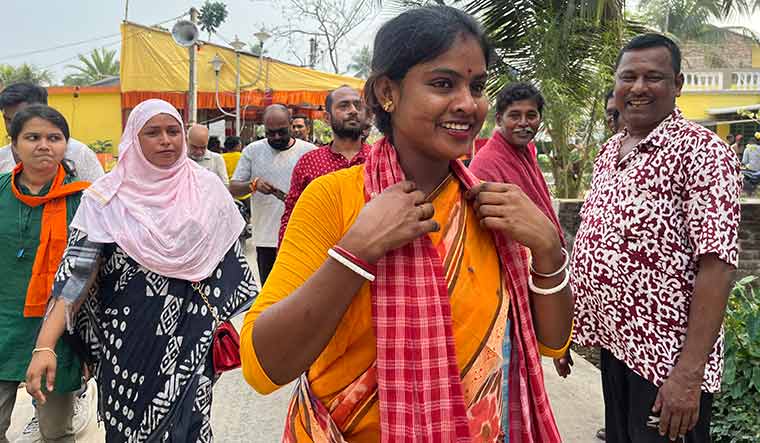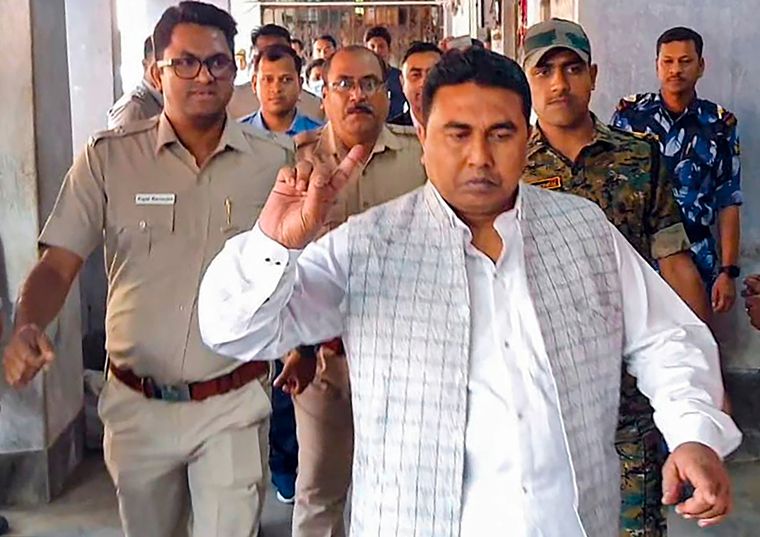The sunset in Sandeshkhali is just as majestic as it is in the Sundarbans. Vast fish farms and mangroves enhance the riverine island’s beauty. The last ferry to the mainland departs around 8pm. There is no accommodation for outsiders, except the state guest house.
Sandeshkhali, situated in the lower Ganges delta in West Bengal’s North 24 Parganas district near the Bangladesh border, has become the focal point of the Lok Sabha elections in the state following a widespread outburst of popular anger against Sheikh Shahjahan, a local strongman and leader of the Trinamool Congress. He was arrested in February after the protests attracted national and judicial attention.
A sense of fear continues to envelope the village, despite extensive police presence. Villagers are afraid to discuss anything about Shahjahan or even to have their photos taken, fearing reprisal from goons. Sandeshkhali was literally ruled by Shahjahan for a long time. Many complaints were filed against him and his associates by the villagers, about land grabs, molestation and their reign of terror. “It may be unbelievable to you, but they wield modern guns. They have a gang of around 300 people,” said a victim. “We never had an option but to follow their orders.”
The situation took a dramatic turn when Shahjahan went into hiding after a case was filed against him for attacking Enforcement Directorate (ED) officials on January 5 during a raid on his house. The ED went after him following allegations about a ration distribution scam. In Shahjahan’s absence, nearly 1,500 women, who had been silent for years, came out against him. They lodged complaints against him and protested for many days with bamboo sticks and brooms, demanding his arrest.
Some protesters torched houses belonging to Shahjahan’s accomplices, Uttam Sardar and Shibu Hazra. Sardar, a member of the zilla parishad and the zonal president of the Trinamool, was later suspended from the party. The Calcutta High Court remarked that it would be “highly shameful” even if one per cent of the allegations of sexual assault in Sandeshkhali were found true.
The Sandeshkhali protests created a major political turbulence when opposition leaders, including a central team of the BJP, were stopped by the West Bengal police from visiting the place. A fact-finding team of ex-bureaucrats and a judge was arrested on their way to Sandeshkhali. West Bengal opposition leader Suvendu Adhikari sought the help of the High Court to visit the place. These incidents, coming just before the Lok Sabha elections, caused embarrassment to Chief Minister Mamata Banerjee and the Trinamool Congress, which came to power with the slogan, “Maa, Mati, Manush (mother, land and people)”. The party eventually suspended Shahjahan, paving the way for a proper investigation.
Prime Minister Narendra Modi met with the women of Sandeshkhali and attacked the state government during his multiple visits to West Bengal. He said women were unsafe in the state, although it was ruled by a woman chief minister. The BJP, which won 18 of 42 seats in the 2019 Lok Sabha elections and then faced a setback in the assembly polls two years later, is relying heavily on the Sandeshkhali incidents to improve its tally.
As Sandeshkhali grows in prominence, so does the woman who is now known across the country as the symbol of the resistance movement. Rekha Patra, a 27-year-old former migrant worker, is said to be the first person to file a police complaint against Shahjahan and his gang, about an attack she faced from one of his associates. According to the complaint filed at the Sandeshkhali police station, he hit her face, pulled her hair and tore her sari, while she was trying to protect her child. She bears a scar on her right cheek from the attack.
Patra is contesting the Lok Sabha polls as the BJP’s candidate from the Basirhat constituency, under which Sandeshkhali falls. Modi talked to her on phone and called her “Shakti swaroopa (an embodiment of Shakti)”. Patra has showcased her political acumen by taking on Mamata and addressing the alleged mafia presence in West Bengal. BJP spokesperson Archana Sengupta said because of Patra, the Trinamool would lose its female vote bank, and that the effect of the atrocities against women in Sandeshkhali would resonate across the state. The BJP has formed a squad of 300 women from Sandeshkhali, including the alleged victims of the atrocities perpetrated by Shahjahan and his supporters. They will share their experiences with voters in all 42 Lok Sabha constituencies in West Bengal.
Sandeshkhali is just like many other border villages in West Bengal, controlled by local strongmen. “We have lodged numerous complaints with the police regarding land grabbing and attacks on women, but nothing has been done,” said Patra. “The police claim they cannot take action without bhaijan’s [brother, referring to Shahjahan] consent.” Former BJP district president Bikash Singh, who was arrested in connection with the agitation, said Shahjahan and his associates had grabbed hundreds of hectares on the island. “Besides, they engage in illegal activities such as cattle smuggling to Bangladesh by land and water. They hold considerable influence in both West Bengal and Bangladesh, and they possess modern guns and ammunition.”
Sandeshkhali is a beautiful island at the mouth of the Sundarbans, which consists of a national park and a large coastal mangrove forest shared by India and Bangladesh. The Kalindi river, a tributary of the Ganges, flows between the islands. The area used to be highly fertile, ensuring high yields for farmers with vast paddy fields. Things changed after the 2009 Cyclone Aila, which increased the salinity of the farmlands, forcing farmers to change the crops they grow.
That was a time of political shift in West Bengal as well. Shahjahan, who was once a CPI(M) cadre, joined the Trinamool when Mamata ended the 34-year rule of the left front. Starting as a labourer who helped drivers get passengers from the ferry, he gradually rose to become a local leader of the Trinamool. He and his associates began fish farming, especially shrimp, which had high demand both domestically and internationally.
“They cut down mangroves to build their farms and took people’s land on lease, but often failed to pay. If someone asked for the lease amount or the return of their land, they would resort to violence,” said Bikash Singh.
Villagers said land grabbing and other atrocities had intensified in the past three or four years. Farmers who lost their land are often compelled to work in the fish farms for meagre wages. Labour is cheap in Sandeshkhali, with men earning Rs300 and women Rs200 to Rs250 for an 11-hour workday.
The ED said Shahjahan accumulated huge wealth through illegal means. “Shahjahan and his associates created fear by engaging in organised crime, including threats of injury, murder, extortion and land grabbing, to gain illegal profits,” said an ED statement.
A victim said Shahjahan’s associates targeted young women. “If they spotted a beautiful girl in the village, they would ask her to come to their place late at night. If anyone resisted, their husband or family members would be brutally beaten,” she said. Rekha Sharma, chairperson of the National Commission for Women, said she received 18 complaints from women in Sandeshkhali, which included two cases of rape, during her visit to the area.
Aside from the pervasive terror, poverty, too, persists in Sandeshkhali. Patra, for instance, could study only till class five as her family had no money. She lives in a small house with her three kids. The house itself is divided into three―one portion each for her husband and his two brothers.
More than 80 per cent of the population in Sandeshkhali comprises scheduled castes and scheduled tribes and many of them lack proper rights over the farms they have been occupying for generations. It has allowed goons and strongmen to usurp their land with impunity. A large portion of the male population in the village is migrant labour. Nearly 70 per cent of them work in south India.
Patra’s husband and his two brothers own a small piece of land where they engage in shrimp farming. The rest of the time, they work as labourers in south India. Patra’s husband works as a mason in Bengaluru, and she herself has worked in Bengaluru and Chennai in tailoring units.
Mamata, meanwhile, expressed confidence that Sandeshkhali would not turn out to be another Singur or Nandigram. She said it was a local issue which the administration had managed to resolve and that the government had returned the usurped land to the villagers. Still, anticipating some backlash, the Trinamool has replaced incumbent MP from Basirhat, actor Nusrat Jahan, with Haroa MLA Nurul Islam.



